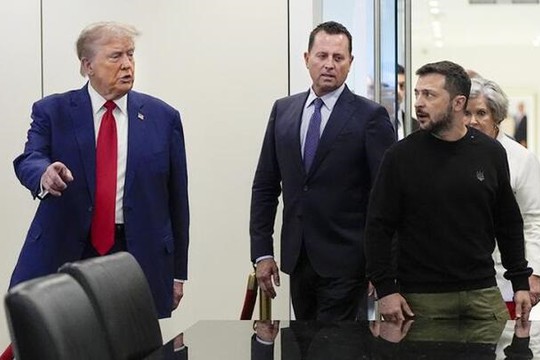New York. Trump shows Zelensky his palace…
Photo: AP
In the corridors of Brussels, there is a sinking feeling that the political will to help Ukraine prevail over Russian aggression is ebbing – on both sides of the Atlantic, writes ‘The Guardian’.
One senior western official told it may take a “second shock” of the magnitude of Russia’s full-scale invasion of Ukraine in February 2022 to jolt western countries out of their funk, and spur Europeans to take more radical steps to boost and integrate their own defences. That shock may involve a sudden collapse of Ukrainian frontline defences, another Bucha-style massacre by Russian forces, or perhaps victory for Donald Trump on 5 November. Any of those would be a disaster for Kyiv.
For now, the US is preoccupied with its presidential election and an escalating war in the Middle East that has pushed Moscow’s grinding advance on the Donbas battlefield out of the headlines. France is distracted by a political and fiscal crisis, with Emmanuel Macron’s power at home and influence in Europe waning fast. Germany is paralysed by feuding in its moribund three-party coalition, which may or may not stagger on until a general election due in September 2025.
And the UK is struggling with its own budget woes as the new Labour government focuses on repairing health and public services amid a media furore over dodgy gifts from political donors. Meanwhile, far-right, pro-Russian parties are gaining ground in many European elections, most recently in Austria.
Russia conquered more Ukrainian territory in September than in any month since March 2022. Yet despite Volodymyr Zelenskyy’s trip to the UN general assembly and Washington to present a “victory plan”, and plead for more weapons and a freer hand to use them on Russian soil, American and European attention has drifted away. For Kyiv, these are dangerous and frustrating times.
Joe Biden, increasingly a lame duck, is avoiding any policy step that could compromise Kamala Harris’s chances of keeping Trump out of the White House. That constrains not only his ability to rein in Israel in its battle with Hamas, Hezbollah and Iran, but also his willingness to authorise Ukraine to strike deep inside Russia with US-supplied missiles or European arms containing US components.
Britain and France, which supply Ukraine with Storm Shadow and Scalp air-to-ground missiles, cannot permit their unrestricted use against Russian rear bases without a US green light. The German chancellor, Olaf Scholz, continues to balk at supplying the Taurus missile system, which Kyiv has long requested to target Russian supply lines and missile launchpads. Scholz’s reluctance is a mixture of electoralism (the Alternative für Deutschland and Sahra Wagenknecht Alliance are both anti-war), historical (his SDP has always been the party of peace) and a fear of singling out Germany for Russian retribution.
EU officials see a parallel between reluctance to provide gamechanging assistance to Ukraine and the stubborn resistance among major European powers against collective borrowing and joint weapons purchases to boost Ukraine’s and their own defences. Many European countries have emptied their threadbare ammunition stocks to supply Kyiv and are struggling to expand national arms industries, or source supplies abroad.
“There was some momentum behind greater European defence integration earlier this year, when the commission published its defence industrial strategy,” a senior official told. “But it has faded since the European elections with the political problems in key capitals.”
read more in our Telegram-channel https://t.me/The_International_Affairs

 9:50 13.10.2024 •
9:50 13.10.2024 •























